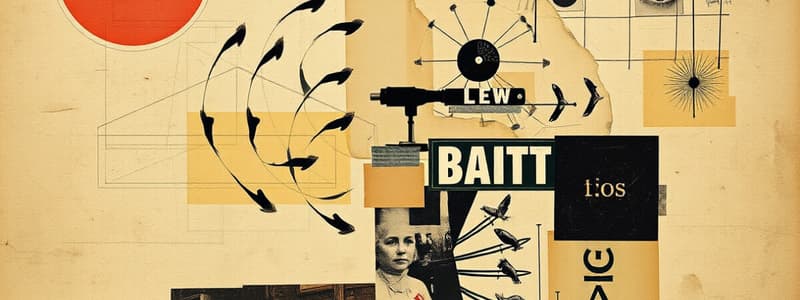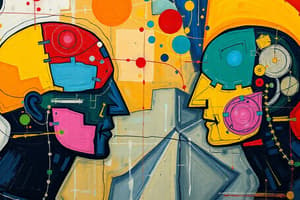Podcast
Questions and Answers
What problem arises when using the pronoun 'they' in the context provided?
What problem arises when using the pronoun 'they' in the context provided?
- It creates ambiguity regarding the antecedent. (correct)
- It is a politically correct term.
- It is always grammatically correct.
- It is easily understood by all speakers.
Which option is described as a politically intrusive alternative?
Which option is described as a politically intrusive alternative?
- 'He or she' as a combined option.
- 'It' as a pronoun.
- 'One' as a pronoun.
- 'She' as a generic option. (correct)
What issue does the phrase 'he or she' create according to the content?
What issue does the phrase 'he or she' create according to the content?
- It emphasizes grammatical accuracy.
- It simplifies understanding across genders.
- It results in cumbersome and awkward sentences. (correct)
- It is preferred in formal writing.
Which pronoun is noted for being dehumanizing and inaccurate?
Which pronoun is noted for being dehumanizing and inaccurate?
What does the combination 'she or he or it' suggest about the author's view on linguistic constructs?
What does the combination 'she or he or it' suggest about the author's view on linguistic constructs?
What sentiment does the author express about 'political correctness'?
What sentiment does the author express about 'political correctness'?
Which construction is primarily criticized for being clumsy and intrusive?
Which construction is primarily criticized for being clumsy and intrusive?
What does the author believe about the intelligence and value of women?
What does the author believe about the intelligence and value of women?
How does the author view the usage of 'politically correct' language?
How does the author view the usage of 'politically correct' language?
What is implied about the alternatives to using traditional pronouns?
What is implied about the alternatives to using traditional pronouns?
What fundamental question does philosophy start with, as exemplified by a baby's inquiry?
What fundamental question does philosophy start with, as exemplified by a baby's inquiry?
Which aspect of understanding distinguishes humans from computers?
Which aspect of understanding distinguishes humans from computers?
What is the term used for the act of understanding that produces concepts in our minds?
What is the term used for the act of understanding that produces concepts in our minds?
How do concepts relate to objective reality, according to the content?
How do concepts relate to objective reality, according to the content?
Which of the following statements accurately reflects the nature of concepts?
Which of the following statements accurately reflects the nature of concepts?
How does understanding through concepts differ from strictly understanding one’s own ideas?
How does understanding through concepts differ from strictly understanding one’s own ideas?
What is the primary argument made about computers in relation to human understanding?
What is the primary argument made about computers in relation to human understanding?
Which creature is suggested to have a closer understanding of its environment than a computer?
Which creature is suggested to have a closer understanding of its environment than a computer?
What is the relationship between concepts and physical things as described?
What is the relationship between concepts and physical things as described?
How does the content characterize the human ability to understand concepts?
How does the content characterize the human ability to understand concepts?
Flashcards are hidden until you start studying
Study Notes
Understanding Logic and Concepts
- Humans raise fundamental questions: What, Whether, and Why. These correspond to key areas of logic.
- The essence of a thing, or understanding its "what," distinguishes human cognition from computer processing.
- Computers merely store and manipulate data; they lack true comprehension or consciousness.
- Comparatively, even simple organisms like amoebas exhibit basic sensations, such as detecting food, making them closer to understanding than computers.
Role of Concepts
- Understanding, or "simple apprehension," forms concepts in the mind, which enable humans to comprehend reality.
- The concept of a house, for example, helps us understand and relate to the physical structure of a house.
- While concepts are mental and independent of physical objects, they allow us to grasp objective reality beyond our subjective experience.
Nature of Concepts
- Concepts can transcend both space and time, allowing for understanding that physical entities cannot achieve.
- The limitations of material things are contrasted with the boundlessness of concepts: one entity cannot occupy multiple locations, but concepts can encompass multiple contexts simultaneously.
Language and Gender Pronouns
- Discusses issues in using pronouns, highlighting potential confusion and ambiguity in grammatical constructions.
- Presents alternatives to the traditional use of "he" that may complicate language or detract from clarity, including combining all forms into cumbersome phrases.
- Emphasizes the danger of politically correct language leading to conceptual confusion and undermining effective communication.
Studying That Suits You
Use AI to generate personalized quizzes and flashcards to suit your learning preferences.




